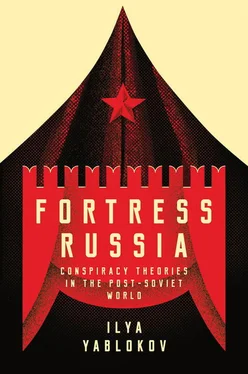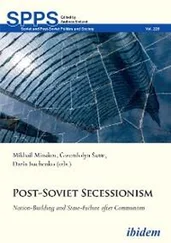The perception of the Soviet collapse as tragic, and the myth that it was deliberately destroyed by political elites in conjunction with the West, has become a tool of political strategy. The political establishment of the 2000s used this idea firstly, to increase national cohesion, and, secondly, to delegitimize political opponents. The narrative of the lost country served as a unifying principle for the creation of a national community. Using this dramatic reading of the Soviet collapse in such a key political speech legitimized further reference to it in subsequent official discourse. The collapse of the Soviet Union became a symbolic construction which defined the borders of the nation and simultaneously marked out its ‘Other’, those who supposedly welcomed the destruction of the Soviet Union and facilitated Russia’s economic and political collapse in the 1990s. In this context, anti-Western conspiracy theories about the origins of the Soviet collapse justified the internal division of society and allowed political opponents to be identified with ‘Western conspirators’, thereby raising concern about their loyalty to the country and their legitimacy as political actors.
Putin’s announcement of the annexation of Crimea in 2014 and Russia’s involvement into the Ukraine crisis can be seen as a case-in-point. The primary point in his address is the tragic loss of Crimea because of the Soviet collapse:
I heard residents of Crimea say that back in 1991 they were handed over like a sack of potatoes. This is hard to disagree with. And what about the Russian state?… It humbly accepted the situation. This country was going through such hard times then that realistically it was incapable of protecting its interests. However, the people could not reconcile themselves to this outrageous historical injustice. (Putin, 2014)
This statement is key to understanding the events behind the annexation of Crimea and the war in Eastern Ukraine. The dramatic and almost overnight fall of the Soviet state in 1991 served as a legitimate reason to annexe the Crimean Peninsula. According to Putin, the return of the territories that had been stolen by the Soviet political elites restores dignity to ordinary Russians who had no say in the process of dissolving the Soviet Union. The will of the Russian leadership to protect the country’s great power status, even at considerable cost to the nation, triggered the war in Ukraine. At the same time, the possibility of a NATO invasion and the threat to Russia’s military presence in the region intensified the fear of war with the West. As the final chapter demonstrates, the idea of a fifth column conspiring against the majority of Russians who supported the Crimean annexation was not only a major tool of social mobilization in the midst of this international crisis but served to promote the new legislative amendments. Fear of the possibility of the state collapsing again (a re-run of what happened in 1991), and the assumption that only malign forces could bring this about, are in many ways crucial for understanding Russia’s political development after 2000.
From the very first days of the Russian Federation’s independence, the notion that the Soviet Union’s collapse had been brought about by the intrigues of the West served, on the one hand, as a unifying platform for patriotic groups, and on the other, as a political concept for different forces in the political establishment. The events of August 1991 possessed a uniquely symbolic potential to become a fundamental element in the foundation of the new state; they could show that totalitarianism had been transformed into democracy thanks to the joint efforts of popular politicians and ordinary Russians. Yet as Kathleen Smith has argued (2002, p. 55), Yeltsin and his team failed to ensure that a commemoration of the August events was central in the collective memory of post-Communist Russia. This fell instead to the Communists and national patriots, who ‘recognized the value of investing organizational resources in spreading their version of events’ using the courtroom, the floor of the legislature, and the streets to propagate an alternative reading of the August 1991 events.
The use of conspiracy theories enhanced the opposition’s criticism of Yeltsin’s policies and facilitated their promotion in the public space, especially against the background of socio-economic difficulties of the 1990s. Despite attempts by Kremlin officials to define the GKChP as ‘plotters’, the alternative reading of the attempted coup – as a staged part of ‘the Western plan’ to destroy the USSR – turned out to be more effective as a political strategy; it generated a sense of solidarity among the people, and delegitimized Yeltsin’s regime.
In the 2000s, the Kremlin reassessed its approach to the events of 1991. The value of a conspiratorial reading of the August coup for political purposes began to be used against the Kremlin’s opponents. The fact of the Soviet collapse, and confusion about why it happened so rapidly, formed the basis of powerful political concepts which were aimed at achieving social and national cohesion. We shall see in the next chapters that widespread belief in the pre-planned collapse of the USSR has been used by the political establishment of Putin’s Russia to solve several domestic political issues. First, the political establishment of the 2000s exploited the lack of public consensus about the August 1991 events; it overdramatized the Soviet collapse, turning the spotlight on the unreliable elites who tolerated the country’s dissolution. This supplied the establishment with a range of populist demands calling for power to be returned to the Russian people so that they could enjoy sovereignty over their own country. The idea of Russia as a ‘sovereign democracy’, which was introduced in the mid 2000s as a mainstream nation-building strategy, charged the Russian political elites and society in general with the task of maintaining independence and rejecting foreign influence.
Second, the use of conspiratorial narratives – shaped, in particular, by the language of the intelligence services, and replicating espionage narratives of the Soviet period – introduces the notion of a ‘subversive agency’ into the daily language of post-Soviet Russia. This operated as a formula which could endow the developments of the present day with familiar meaning. As Oushakine puts it, the Soviet past became ‘an object of purposeful commodification and a product of active post-Soviet cultural consumption’ (Oushakine, 2000, p. 999). The sense of a common experience was transmitted to the masses through the promotion of nostalgia about the Soviet past, generated by means of various symbolic models. This experience was associated with the bond between ‘agents’, ‘Western subversion’ and the collapse of the Soviet Union and served to provide a simplistic but powerful instrument to distinguish ‘the people’ from the ‘Other’. The model was also sufficiently flexible to be extended to fit different situations, so that the Other could be NGOs, political parties or particular politicians.
The official narrative of the August coup, as disseminated through the media and the public speeches of intellectuals and politicians, merged nostalgia about the lost Soviet Union with the idea that Russia has been besieged by countries interested in the acquisition of its abundant natural resources and vast territory. This reading of the August events closely linked the Soviet collapse to the loss of national identity and unambiguously marked it as a tragic landmark in the history of Russia. The Russian authorities used charges of conspiracy against political opponents to blame them for plotting against independent Russian statehood, which had already been destroyed once before, in 1991. This established a precedent for several significant political reforms in the 2000s which substantially curtailed public liberties. The authorities also used positive public attitudes towards the Soviet Union as a means for creating national cohesion. According to the polls regularly conducted by the Levada-Centre , it would seem that this perception of the August coup found a positive response in Russian society. Around one-third of Russians see the coup as ‘a tragic event which had sinister consequences for the country’, while another third perceive it, sceptically, as a struggle for power (Levada-tsentr, 2016a). This disillusionment makes it easier to use the notion of conspiracy in relation to the August coup in political strategies, something which is constantly happening under Putin’s reign.
Читать дальше
Конец ознакомительного отрывка
Купить книгу












